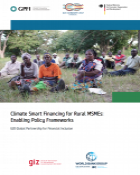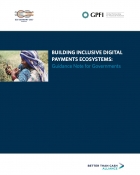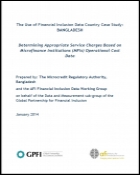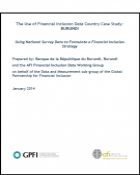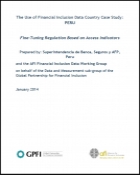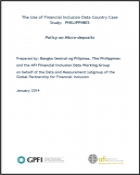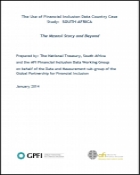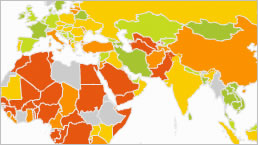Report | Aug 3, 2017
Climate change increases risks and presents significant challenges as well as potential opportunities for rural Micro, Small and Medium Enterprises (MSMEs.) However, financing is crucial for enabling these MSMEs to adopt needed practices and investments in technologies and approaches that are climate smart. This is particularly challenging for those MSMEs in the rural and agricultural setting which are most vulnerable and already have the most difficulties accessing finance.This document presents a synthesis of the key lessons and implications of climate change needs and solutions for MSMEs in developing countries with an emphasis on the implications for governments and development agencies to consider. It is enriched with many case examples of practices implemented around the world. Based
Report | Jun 20, 2017
This note provides policymakers and other government oficials with an overview of the major practical issues to consider when planning the expansion of financial inclusion through the use of digital payments ecosystems. It briefly describes the potential of such ecosystems to advance financial inclusion. It then outlines how to address four key challenges when implementing the principles and policy recommendations of the G20, its implementing partners, and global financial system standard setters. It provides practical solutions that government oficials can follow to help structure their approach when facing these common challenges.
Report | Nov 17, 2014
This report, compiled and published by the SME Finance Forum on behalf of the G20 Global Partnership for Financial Inclusion SME Subgroup, features case studies on promoting growth for small and medium enterprises (SMEs). The case studies codify a range of real-life examples of policy interventions and regulatory changes that promote SME growth through improved access to finance.
Report | Mar 16, 2017
The Microcredit Regulatory Authority (MRA) of Bangladesh was concerned about the high interest and service charges set by MFI’s on consumers. They set out to develop a framework to protect consumers, while at the same time enable MFI’s to operate sustainably. The study describes the data gathering, the consultative process and the support provided in setting a fair and consistent rate. This policy is monitored regularly and continues to show compliance by MFI’s, improved efficiency in MFI operations and greater benefit to the end consumers.
Report | Mar 16, 2017
The Bank of the Republic of Burundi (BRB) realized that they couldn’t develop effective financial inclusion policies without reliable data on access, usage and quality of financial services in the country. To this end and with support from AFI, they undertook a national demand-side survey to diagnose the state of financial inclusion. The study describes the multi-stakeholder approach, involving both the public and private sector and gives a summary of the findings. The findings enabled policy makers to identify barriers and areas of focus for financial inclusion, leading to the development a national strategy. The data also enabled policymakers to set national financial inclusion targets.
Report | Mar 16, 2017
The financial inclusion situation in Mexico required policy development to address the disparities in usage and reach of financial services between urban and rural areas. The study describes the formation of the national coordinating body for financial inclusion and the development of a comprehensive data framework to inform policy. The banking agents, mobile payments and tiered-risk account policies and regulations introduced to increase financial inclusion, particularly in the under-served areas, are described. The effects of these interventions are quantified through appropriate data and the remaining challenges to improve the situation are identified.
Report | Mar 16, 2017
The study describes the recent evolution of financial inclusion initiatives in the country. It highlights the development and use of core data indicators on access, usage quality and the influence of these on policy formulation. The introduction and results of banking agents are described, as well as the use of monitoring data that lead to the introduction of simplified accounts to increase usage after the banking agent innovation.
Report | Mar 16, 2017
The Philippines introduced a micro-saving framework in 2010 to encourage savings in the microfinance market, through a simplified low cost account with a limit on daily balance. The study describes the steps that the regulator took when it appeared that the limit on the balance had an adverse effect on propensity to save. It describes the data gathering exercise and the subsequent policy adjustment, based on the analysis of the data. It highlights the success of the change in policy in terms of increased savings in micro-deposits.
Report | Mar 16, 2017
South Africa faced significant inequalities at the beginning of the century, including constrained financial inclusion. As part of a social pact to improve the situation, the banking industry launched a joint simplified product, the Mzansi account. The study details the effect of the introduction of the product and the simultaneous improvement in physical access for banking services, through the use of agreed measurement efforts. It also assesses the situation after the Mzansi initiative and identifies current drivers and issues influencing further improved financial inclusion.
Report | Nov 15, 2013
One of the obstacles to more effective financial inclusion is that the international standards that guide the delivery of financial services were originally conceived for developed countries. Yet the practical realities in developing countries, which are home to an estimated 90% of the world’s financially excluded, are very different. This report, published by the Alliance for Financial Inclusion in its capacity as Implementing Partner of the GPFI, highlights how international standards and their application can be improved to accommodate these differences, based on an analysis of five countries: Brazil, Kenya, Mexico, the Philippines and South Africa.


